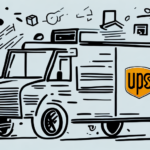Cost of Insuring a Package with UPS
Shipping a package with UPS involves potential risks such as loss, damage, or theft. To mitigate these risks, UPS offers package insurance options, ensuring that your items are protected during transit. Understanding the cost and value of insuring your package is essential to make informed shipping decisions.
Importance of Insuring Your UPS Shipments
Accidents during the shipping process are not uncommon. Packages can be lost, damaged, or stolen, leading to significant financial losses if uninsured. Insuring your package with UPS provides peace of mind, ensuring that you are reimbursed for the full value of your shipment in case of unforeseen events.
Protection Against Common Shipping Risks
Insuring your package covers scenarios such as:
- Loss or misplacement during transit
- Damage from handling or accidents
- Theft or unauthorized access
Coverage for Fragile and High-Value Items
Items like electronics, artwork, and glassware are more susceptible to damage. UPS insurance offers an extra layer of security, ensuring these valuable items arrive safely.
Types of Insurance Offered by UPS
UPS provides various insurance options tailored to different shipping needs:
- Declared Value: Standard coverage up to $100 for most shipments.
- Excess Value: Additional coverage beyond the standard declared value for an extra fee.
- Declared Value with Freight Forwarding: Enhanced coverage for high-value freight shipments.
- Declared Value with Signature Confirmation: Requires a signature upon delivery, offering extended coverage for valuable packages.
For international shipments, UPS offers specific insurance options based on the destination and package value. It's advisable to review the UPS Insurance Services for detailed information.
Determining the Value of Your Package
When insuring a package, accurately declaring its value is crucial. The declared value should encompass the cost of the items, shipping fees, taxes, and any other associated costs.
The maximum declared value for most UPS shipments is $50,000. For packages exceeding this amount, you must contact UPS directly to arrange special handling and insurance. Overestimating can lead to unnecessary costs, while underestimating may result in insufficient coverage.
Conducting market research and ensuring that all associated costs are included will help in declaring the correct value of your package.
Factors Influencing the Cost of UPS Package Insurance
The cost of insuring a package with UPS varies based on several factors:
- Declared Value: Higher declared values increase the insurance cost.
- Package Type: Envelopes may cost less to insure compared to boxes.
- Shipping Method: Air shipping is generally more expensive than ground shipping.
- Destination: International shipments may have higher insurance costs.
- Seasonality: Shipping during peak times, like holidays, can result in higher insurance premiums.
On average, insurance costs around $1 for every $100 of declared value, though this can fluctuate based on the aforementioned factors.
For high-value packages exceeding $100,000, UPS offers the Parcel Pro service, providing coverage up to $150,000 with specialized handling and tracking.
Strategies to Save on UPS Package Insurance
While insurance is essential, there are ways to manage and reduce its cost:
- Secure Packaging: Properly packaging items reduces the risk of damage, potentially lowering insurance costs.
- Optimize Package Size: Using smaller packaging can decrease the declared value if possible.
- Flexible Shipping Times: Shipping during non-peak periods can result in lower insurance premiums.
- Choose Ground Shipping: Opting for ground over air can reduce insurance expenses.
Additionally, some shippers opt for self-insurance by setting aside funds to cover potential losses instead of purchasing insurance. This approach is best suited for low-value items or experienced shippers with reliable packaging methods.
Handling Lost or Damaged Packages with UPS
If your package is lost or arrives damaged, you can file a claim for reimbursement through UPS:
- Log in to your UPS account and navigate to the "Claims" section.
- Select the affected shipment.
- Provide necessary documentation, such as receipts or invoices, to verify the package's value.
- Submit your claim for review.
The claims process typically takes a few days to several weeks, depending on the complexity. Ensure you provide all required documentation to expedite the process.
UPS Claims Guidelines
UPS has specific guidelines regarding what constitutes a lost or damaged package. For instance, delays do not qualify as loss. Additionally, certain items like perishable goods may require special insurance considerations.
Review UPS's official claims support page for detailed information.
Avoiding Common Insurance Mistakes with UPS
To ensure smooth insurance processes, avoid the following common mistakes:
- Underinsuring: Always declare the full value of your package to avoid insufficient compensation.
- Poor Packaging: Securely package items to minimize damage risks during transit.
- Lacking Documentation: Keep all receipts and proof of value to support your insurance claims.
Additionally, familiarize yourself with UPS's specific insurance requirements for certain items, such as jewelry, to ensure proper coverage.
Comparing UPS Insurance with Other Shipping Carriers
UPS is not the only carrier offering package insurance. Other major carriers like FedEx and USPS provide their own insurance options.
When choosing the best insurance for your needs, consider factors such as:
- Cost: Compare the premiums across carriers.
- Coverage Limits: Ensure the carrier covers the total value of your package.
- Claims Process: Evaluate the ease and efficiency of filing claims.
Ultimately, the optimal choice depends on balancing coverage needs with affordability. Reviewing the comparison guides can help in making an informed decision.
Conclusion
Insuring your packages with UPS is a critical step in safeguarding against potential losses during shipping. By understanding the types of insurance available, accurately declaring your package's value, and avoiding common pitfalls, you can ensure comprehensive protection for your shipments.
Furthermore, comparing UPS's insurance offerings with those of other carriers can help you select the most suitable and cost-effective option for your shipping needs. Always stay informed about the latest policies and procedures to maintain optimal protection for your valuable items.






















